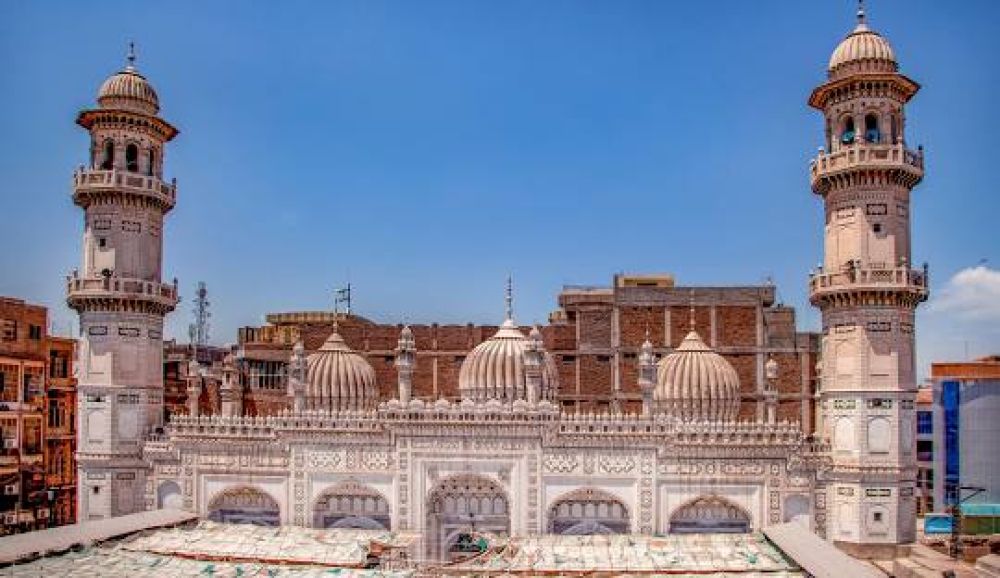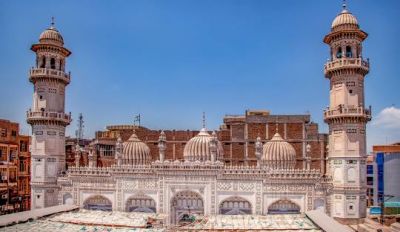

Experience an in-depth guided historical tour of the Mahabat Khan Mosque, one of Peshawar's most iconic structures. This activity offers visitors the chance to learn about the rich history of the Mughal era as the mosque dates back to the 17th century and was built by the then-governor of Peshawar, Mahabat Khan. Admire the intricate Mughal architecture, the majestic prayer hall, and beautifully crafted minarets. The guide will share stories and insights into the mosque's design, construction, and its significance over the centuries including its survival through various historical periods. Participants will also get a glimpse into the cultural and religious practices associated with the mosque, making this tour a truly immersive experience.
Capture the majestic beauty of the Mahabat Khan Mosque through your lens with a photography session. Whether you are a professional photographer or a hobbyist, this activity will give you the opportunity to photograph one of the most photogenic landmarks in Peshawar. The mosque's facade offers intricate lattice work, while the interior is filled with geometric patterns and calligraphy, allowing for stunning compositions. Participants should respect the sanctity of the place and schedule photography sessions around prayer times or when the mosque is less crowded to minimize disturbance. Remember to ask for permission if you wish to photograph the local worshippers.
Join a cultural exchange meetup at the Mahabat Khan Mosque where visitors and locals come together to share and learn about each other's cultures and traditions. This activity is often organized by local cultural associations and provides an enriching experience for both international tourists and residents. Participants will discuss various topics, including the significance of the mosque, Islamic traditions, local customs, and the importance of preserving cultural heritage. It's not only a chance to gain new insights but also to make new friends and connections. The activity is typically hosted in areas of the mosque where non-worship activities are permitted and is respectful of the mosque's environment.
For those interested in experiencing spiritual aspects of the mosque, observing the evening prayer can be an illuminating experience. Mahabat Khan Mosque comes alive with the voices of the faithful during the Maghrib prayer, just after sunset. Visitors are welcome to observe from a respectful distance, and this can be an opportunity to reflect on the day's passing and experience a moment of collective spirituality. It is recommended for visitors to dress modestly and ensure that they do not disturb the worshippers during this profound communal act.
Immerse yourself in the art of Islamic calligraphy at the Mahabat Khan Mosque with a workshop led by a local expert. Participants will learn about the history of Arabic calligraphy, its various styles, and its significance in Islamic art and culture. The workshop provides hands-on instruction on how to create beautiful calligraphic designs, often inspired by the very motifs that adorn the mosque. This activity is both educational and therapeutic, offering a unique way to engage with the cultural heritage of Peshawar and Islam. All necessary materials are typically provided, and participants will have the chance to take home their own piece of calligraphy as a memento.
Delve into the world of Islamic scholarship with a seminar hosted at the Mahabat Khan Mosque. These sessions can range from beginner to advanced levels and cover various aspects of Islamic teachings, history, and law. It's an ideal setting for a spiritual and intellectual journey, given the mosque's historic connection to learning and education. Typically, these seminars are led by knowledgeable scholars who are well-versed in Islamic jurisprudence and theology. Such activities cater to those keen on understanding the nuances of faith and its application in daily life while respecting the scholarly tradition associated with Islamic institutions.
Explore the architectural marvels of the Mahabat Khan Mosque with a focus on Islamic architecture study. This activity could be both an educational excursion and a passion project for students or enthusiasts of architecture. The mosque offers an excellent example of Mughal-era construction techniques, design aesthetics, and architectural innovations. Participants will explore the key features that define Islamic architecture—such as domes, arches, minarets, and ornamental inscriptions—and understand how they have been incorporated into the structure of the mosque. This study can also delve into the mosque's restoration and conservation efforts, highlighting the importance of preserving historical landmarks.
Engage in meaningful conversations at the Interfaith Dialogue Session held at Mahabat Khan Mosque. This activity is dedicated to building bridges between various religious communities and promoting mutual understanding and respect. During these sessions, representatives from different faiths come together to discuss shared values, common challenges, and ways to work together for the betterment of the community. It's a powerful platform for fostering peace and harmony across different cultural and religious backgrounds, reflecting the mosque's role as a center for social cohesion and dialogue.
Occasionally, the Mahabat Khan Mosque becomes the venue for a sublime expression of spirituality through Sufi music. When such events are organized, they typically involve local musicians and vocalists performing Qawwali, a form of devotional music rooted in the Sufi tradition. The powerful drums, harmonium, and soul-stirring vocals echo through the mosque courtyards, inviting participants to experience a deeper connection with the divine. It's an auditory journey that transcends the daily hustle and uplifts the spirit. These evenings are special occurrences and are highly appreciated by attendees for their cultural and spiritual value.
The Mahabat Khan Mosque is not just a place of worship; it's also a center for community service and charity work. Join in volunteer activities organized by the mosque to give back to the local community. This could involve distributing food to the needy, participating in clean-up drives, or helping with educational programs. Such activities are usually open to everyone, with the mosque providing an inclusive space where individuals from all walks of life can contribute to the well-being of others. It's an opportunity to put the principles of kindness and service into practice while engaging with like-minded individuals.
